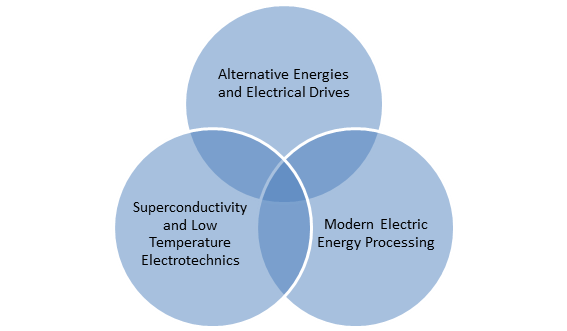Research Lines

The research of our group focuses on electrical energy efficiency and the sustainable development of inherent technologies.
Research is divided in three main interrelated topics:
- Modern Electric Energy Processing
- Alternative Energies and Electrical Drives
- Superconductivity and Low Temperature Electrotechnics
Modern Electric Energy Processing (Power Electronics)
Modern Energy Processing involves the recent trends in power electronics aimed to achieve:
- Highest possible efficiency of power convertors (e.g. through soft switching and resonant conversion).
- Most efficient storage of energy (e.g. by modern battery stacks management).
- Efficient utilization of environment energies (e.g. mechanical, thermal, electromagnetic) as additional autonomous sources of electrical energy (including the specific power converters).
- The most convenient and efficient transfer of electrical energy applying non-conventional methods (e.g. contactless charging, rotary transformer, high-frequency energy beams, etc.).
Alternative Energies and Electrical Drives
Alternative Energies and Electrical Drives is concerned with the design, supply, operation and control of electrical drives, to meet the future demand of energy usage while satisfying the current and future environmental constrains. These concerns cover several topics, going from the supplied energy, the design of the drive itself, its control and related power quality issues, fault diagnosis and fault tolerant operation, to its integration into modern intelligent facilities. The research approach involves not only technological issues, but also mathematical and computational techniques for modelling, estimation and control of these systems.
Superconductivity and Low Temperature Electrotechnics
RThis research area is related with the application of high temperature superconductors (HTS) in power systems, due to the specific properties of these materials, as non-linear impedance, flux pinning, diamagnetic behaviour and low losses when compared to conventional conductors. Investigated systems are:
- Magnetic shielding inductive fault current limiters.
- SMES (Superconducting Magnetic Energy Storage) for power quality applications.
- Fractional horsepower motors.
Other aspects of superconducting technologies are developed, as:
- Cryogenic characterization of ferromagnetic materials for HTS power transformers.
- Power electronics for cryogenic drives.
A strong effort is dedicated to the development of modelling techniques for design and simulation of HTS materials and devices.